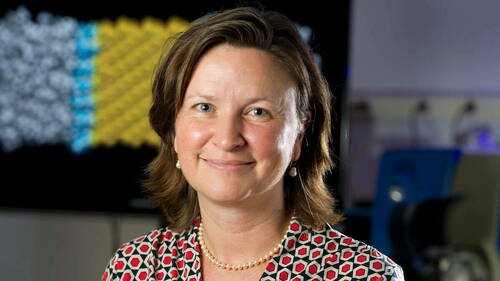
Patricia Clark, Rev. John Cardinal O’Hara, C.S.C., Professor of Biochemistry at the University of Notre Dame, has been awarded a $1.1 million, four-year grant from the W. M. Keck Foundation to develop an innovative approach to replicate in test tubes a universal component of protein folding within cells.
Results from this medical research grant could shed new light on how deadly bacterial infections spread.
Clark and her colleagues, including Masaru Kuno, professor in the Department of Chemistry and Biochemistry, will exploit a new technology to tackle the complex folding mechanisms of autotransporter proteins, which are proteins with properties that help them cross bacterial membrane systems. Autotransporter proteins contribute to infections from bacteria such as E. coli and salmonella.
“I am deeply grateful to the Keck Foundation for their support of highly innovative, paradigm-breaking research projects,” Clark said. “This high level of innovation is necessary to break through the technical barriers that constrain our current understanding of protein folding.”
Proteins are long chains of amino acids that fold into specific three-dimensional structures, giving them their active shapes and determining their interactions with other molecules in the cell. Protein folding has been studied in test tubes for more than 70 years, but the folding process is different inside cells. In the cell, proteins fold from one end to the other as they are synthesized or transported across a membrane. Currently, there is no way to replicate this “vectorial” folding mechanism in the test tube.
Fully understanding how the vectorial folding mechanism responds during each of these membrane transport processes may be the key to eventually stopping the fold in its tracks. Clark will use a combination of other proteins and solid-state technology to develop a way to initiate this type of protein folding in the test tube, allowing her and her colleagues to study cellular folding mechanisms in unprecedented detail.
By learning more about why proteins fold like they do, Clark and her colleagues may be able to prevent the spread of infectious diseases.
“We are honored that the Keck Foundation has recognized Professor Clark’s and Professor Kuno’s groundbreaking medical research in molecular biophysics,” said Mary Galvin, the William K. Warren Foundation Dean of the College of Science. “We are grateful to the foundation for providing this grant for work that has the potential to transform the understanding of how proteins fold and spread disease.”
Based in Los Angeles, the W. M. Keck Foundation was established in 1954 by the late W. M. Keck, founder of the Superior Oil Company. The foundation’s grant-making is focused primarily on pioneering efforts in the areas of medical, science and engineering research. The foundation also maintains an undergraduate education program that promotes distinctive learning and research experiences for students in the sciences and in the liberal arts, and a Southern California Grant Program that provides support for the Los Angeles community, with a special emphasis on children and youth from low-income families, special needs populations and safety-net services. For more information, visit www.wmkeck.org.